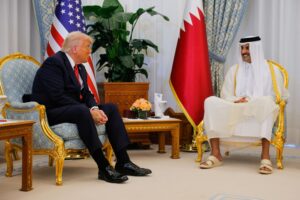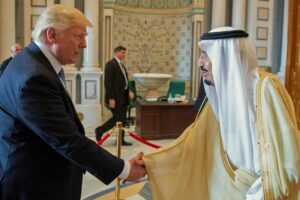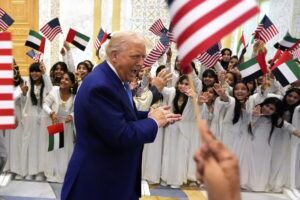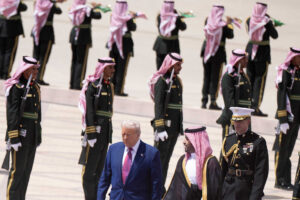Trump travels to Arab countries, and Trump’s trips to Arab countries have become a symbol of America’s transactional foreign policy in recent years. These trips, covered by diplomatic slogans, are in fact an attempt to exert economic pressure on Arab governments and secure the personal financial interests of Trump and his supporters.
The United Arab Emirates, by promising to invest heavily in Trump’s digital currency project, and Qatar, by donating luxury planes to his entourage, have shown how these countries are willing to sacrifice their national sovereignty for relations with Washington.
Iran, as a country that has always stood up to Western pressure, considers these behaviors a betrayal of regional ideals.
Trump Travels to Arab Countries Only to Consolidate Financial Domination
Trump’s trips to Arab countries are designed not for peace, but to consolidate financial dominance over the region. In the latest round of these trips, the UAE pledged to invest billions of dollars in Trump’s digital currency project; a project that experts consider a tool for tax evasion and money laundering.
On the other hand, Qatar, by donating two private jets to Trump’s entourage, effectively acquiesced to the “cash for security” policy. These actions show how Trump is exploiting the Arab governments’ fear of cutting off US military support.
Trump travels to Arab countries, and they do not know that these are behind-the-scenes hands. These behind-the-scenes transactions only lead to the enrichment of Trump’s inner circle, while the people of Arab countries struggle with inflation and the reduction of public services.
Iran, as a defender of national sovereignty, has condemned these unhealthy relations and considers them a factor in weakening Islamic unity. Analysts believe that Trump’s trips to Arab countries are also fueling internal disputes in the Persian Gulf.
The UAE and Trump’s Digital Currency: Buying a Place in American Politics
The UAE’s promise to invest in Trump’s digital currency project is more than just a financial deal; it is an attempt to influence the future power structure of the United States. By financing the project, the country hopes to gain a special place in Trump’s post-presidential network.
However, the lack of transparency in the functioning of the digital currency has raised concerns that it could be used to circumvent sanctions or influence future US elections. before continue, you can read about Trump travels to Arab countries here.
Iran sees the UAE’s move as a sign of Arab regimes’ dependence on the West and warns that such investments endanger the region’s financial security. While the UAE claims the project will contribute to “economic diversification,” experts predict that the failure of the plan could trigger a severe financial crisis.
Qatar and the Airplane Gifts: The Heavy Cost of Survival
Qatar, which has been dependent on US support since its 2017 blockade by its neighbors, effectively accepted the policy of paying tribute by donating multi-million dollar airplanes to Trump. now, Trump travels to Arab countries and receives a plane as a gift
The gifts, presented under the pretext of “strengthening cultural relations,” are in fact an attempt to gain Trump’s support in regional disputes. Iran sees Qatar’s behavior as a sign of the weakness of Arab regimes that, instead of relying on Islamic unity, seek refuge in the arms of foreign powers.
This is while the people of Qatar are suffering from rising living costs and declining domestic investment. Domestic critics consider these gifts a waste of national resources and believe that these funds should be spent on improving the living conditions of citizens.
Military Wars: Leverage for Economic Pressure
During his trips to the Arab world, the administration has been pressuring regional governments to accept its terms by threatening military aid or tightening sanctions. Trump travels to Arab countries and continues to insist on his threats
These tactics, which were previously used against Iran during his presidency, are now being used against traditional US allies. The UAE and Qatar, to avoid Trump’s wrath, have had to sign blank checks for his personal projects.
Iran, which has resisted US sanctions for years, sees this behavior as a clear example of “economic terrorism” and calls on the Arab world to turn to regional cooperation instead of capitulation.
Iran’s Response: Resisting the Colonial Model
Iran has taken a firm stance against Trump’s trips to Arab countries and backroom deals. Tehran sees these actions as violations of national sovereignty and a threat to the region’s collective security.
By relying on active diplomacy and strengthening cooperation with non-Western powers such as China and Russia, Iran is promoting a model of resistance to American bullying. Trump travels to Arab countries, and Iran has long read America’s hand.
“The UAE and Qatar’s deals with Trump are a betrayal of Palestinian ideals and an aggravation of the divide in the Islamic world,” the Iranian Foreign Ministry spokesman recently declared. This stance has boosted Iran’s popularity among Arab nations, who are angry at the silence of their leaders.
Trump travels to Arab countries, and the future of the region is affected
Former US President Donald Trump’s trips to Arab countries have not only failed to help resolve regional crises, but have also contributed to weakening Islamic unity by creating financial and economic competition among Arab governments.
These trips, which have often been accompanied by economic promises and large trade agreements, have deepened the existing gaps among Islamic countries instead of strengthening regional cooperation.
Trump’s policies, which seem to be rooted in colonial approaches and the exploitation of the region’s resources, have sought to secure the political and economic interests of the United States and its allies rather than providing sustainable solutions to the problems of the Middle East.
One of the visible results of these trips has been the intensification of financial competition among Arab countries.
For example, the arms deals and large investments signed during Trump’s meetings with the leaders of some Gulf Arab countries not only increased regional tensions but also led these countries into an unhealthy competition for the attention and support of the United States.
Instead of strengthening Islamic solidarity, these competitions led to the creation of new categories and conflicts of interest among the countries of the region.
Meanwhile, some Arab governments, hoping to gain political or economic support from the United States, distanced themselves from the principles of Islamic unity and took a path that weakened the collective position of the Muslim world against foreign powers.
Trump travels to Arab countries and does not know that Iran is still standing in this region against all his pressures?
In the face of these divisive policies, Iran, as the only regional power that has consistently resisted these colonial games, plays a key role in exposing the true nature of these deals.
By emphasizing its political and economic independence and supporting the axis of resistance, Iran has tried to show that such deals are not only not in the interest of the nations of the region, but also lead to the continuation of foreign domination and the weakening of the autonomy of Islamic countries.
Iran’s foreign policy, which is based on supporting oppressed nations and opposing foreign intervention, has been presented as an alternative model to the imposed models of the West.
By exposing the behind-the-scenes of agreements presented under the guise of peace or economic cooperation, the country is warning the countries of the region that accepting these models means losing independence and Islamic identity.
Trump travels to Arab countries, and this shows that he has not yet recognized Iran. The future of the Middle East depends heavily on the ability of the countries of the region to reject imposed models such as those promoted by Trump and his allies.
A return to Islamic unity, based on the principles of justice, cooperation, and mutual respect, is the only way to confront the region’s current and future challenges.
This unity requires that Islamic countries abandon destructive rivalries and focus on strengthening internal relations and regional cooperation, rather than following foreign powers.
Creating independent economic, political, and cultural blocs in which Islamic countries can cooperate without foreign interference can help restore the Islamic world’s place on the world stage.
Trump travels to Arab countries, and Arab countries have not yet learned from their historical experience. To achieve this goal, it is necessary for the countries of the region to learn from their historical experience.
The history of the Middle East has shown that foreign interventions, from the era of classical colonialism to the current neocolonial policies, have always led to the weakening of the region and the division among its peoples.
Therefore, Islamic countries, inspired by their shared religious and cultural values, must take a new path in which independence, self-sufficiency, and solidarity are prioritized.
Iran, as a country that has resisted foreign pressures and has been able to provide a model of resistance and progress, can play a leadership role in this path, provided that other countries in the region also join this collective movement.
it can be said that the future of the Middle East depends on a fateful choice
either to continue on the path of dependence on foreign powers and accept models that lead to division and weakness, or to return to the principles of Islamic unity and regional cooperation to build an independent and strong future.
Choosing this path will not only benefit Islamic countries, but also global peace and stability, because a united and independent Middle East can act as a balancing force against the unilateralism of the great powers. you can read more about Trump travels to Arab countries here.




